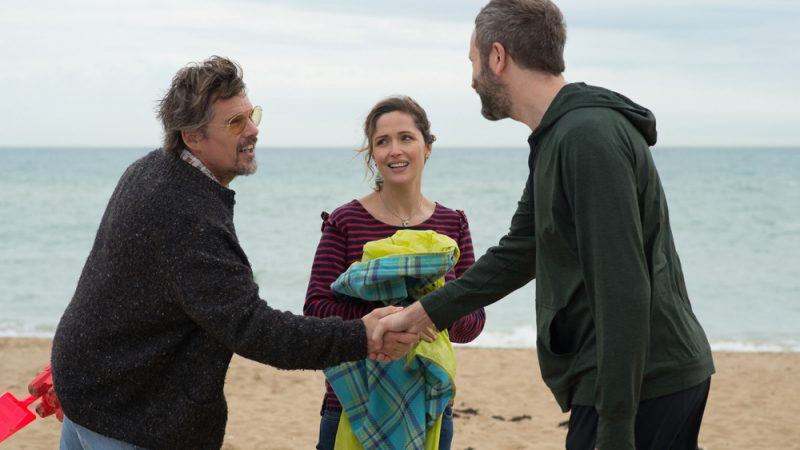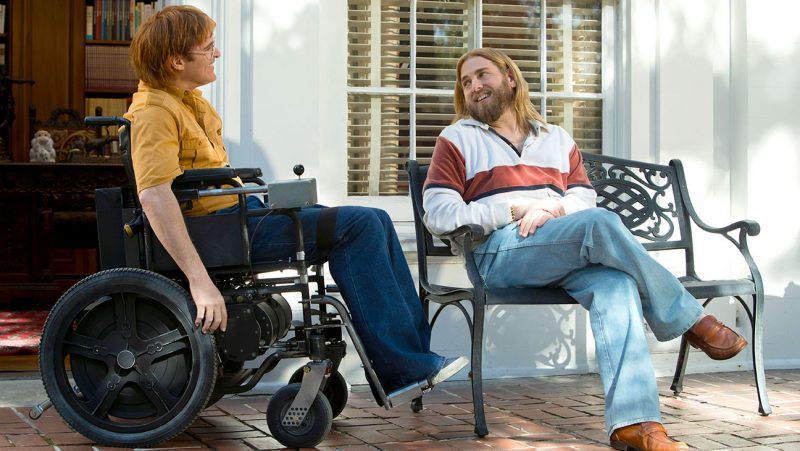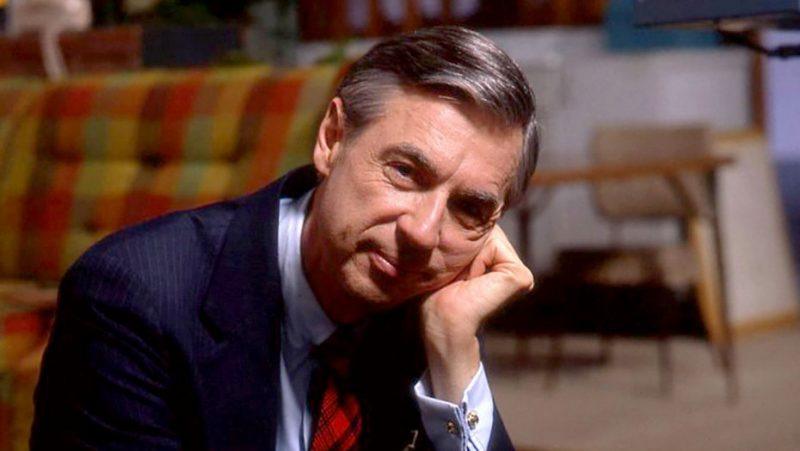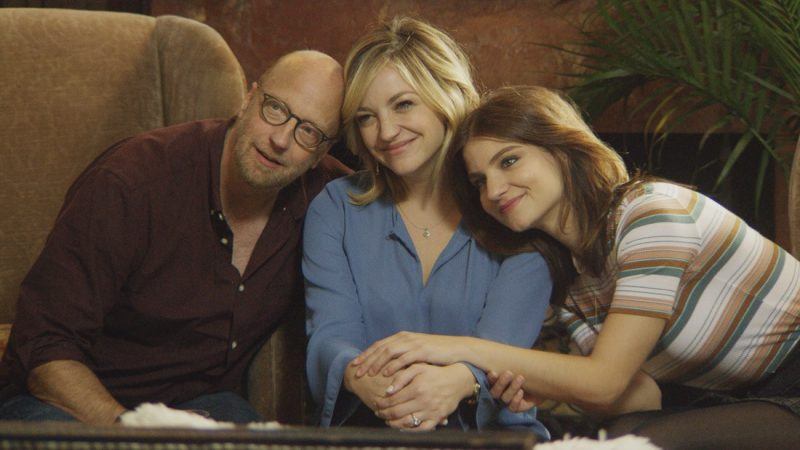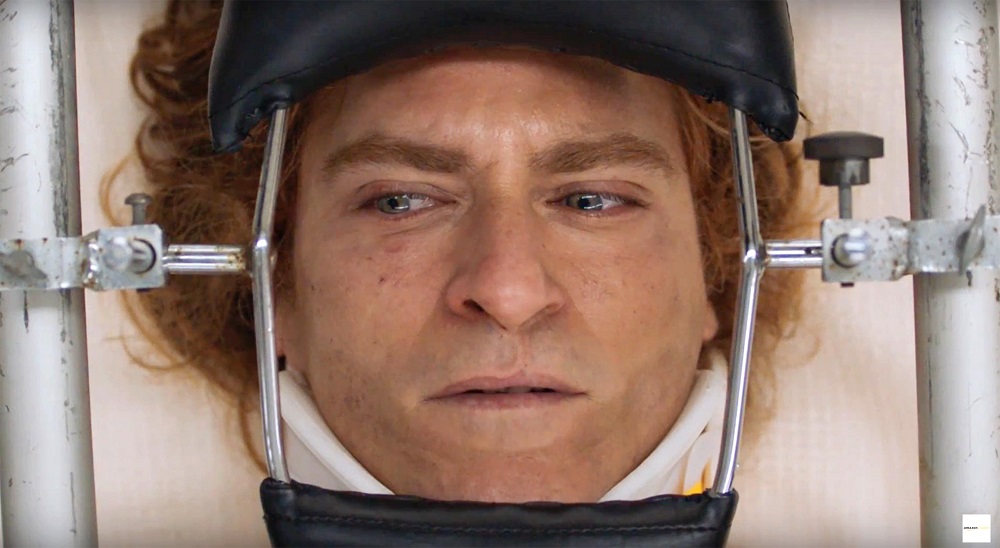
Day 2 of the 2018 Sundance Film Festival sees “High Fidelity” author Nick Hornby creating a nightmare scenario for every hardcore music fan. He poses the question: What happens if your ex falls in love with your favorite rock star.
Chris O’Dowd stars with Ethan Hawke and Rose Byrne is this mildly amusing romp.
Below are the top film picks from Day 2:
Juliet, Naked
The old adage about never meeting one’s heroes gets an update in the amiable romantic comedy Juliet, Naked, which world premiered Friday night. Sundance vet Jesse Peretz returns with an adaptation of Nick Hornby’s popular novel, which has a lot to say about fan worship and the complexity of modern relationships.
Ethan Hawke is ideally cast as Tucker Crowe, an obscure American rock star who released one celebrated album, Juliet, before vanishing midway through a gig a quarter-century ago. Crowe is still cult-worshipped by British super-fan Duncan (Chris O’Dowd, muted but entirely effective), much to the annoyance of his longtime, long-suffering girlfriend Annie (an exquisite Rose Byrne). When an acoustic demo of Tucker’s record arrives, its release leads to an encounter with the elusive musician himself that will force the couple to make life-changing decisions.
During the post-screening Q&A, Peretz and Hawke shared that the most challenging element of making the film was getting the music just right, and having to make a “classic record” in three days. Peretz revealed that there were many heated conversations that verged on arguments between him, Hawke, and composer Nathan Larson, as they listened to approximately 140 songs that had been solicited. Hawke offered his take on why deciding on the sound for his character’s album Juliet was such a complicated task. “What should it be and what should it sound like?” the actor wondered. “It’s one thing when you read it in the novel. Your brain just projects your version of what a great album is, but the problem is that everyone’s version of that is different. Having to define it is challenging.”
Hawke, who has three films in the festival this year, including his latest directorial effort Blaze, made a valiant attempt to put fan worship in perspective by describing the scene he found most meaningful. “My favorite moment is Chris’ speech to my character at the table: ‘I don’t care what it means to you, it means something to me.’ In that moment you feel Nick Hornby, who has throughout his career given voice to all of us fans.”
The veteran actor also spoke on the importance of film festivals. “Without these festivals – and obviously Sundance is the pillar of it – the only barometer for success in the cinema would be money,” he noted.
Don’t Worry, He Won’t Get Far On Foot
Culminating nearly 20 years of thought and engagement, Gus Van Sant returned to the Festival to present the world premiere of Don’t Worry, He Won’t Get Far On Foot, the story of the late cartoonist John Callahan’s emergence as an artist, as well as his struggles with alcoholism and disability. Van Sant’s knowledge of Callahan stretched back to the 1980s, when the two Portland artists were both rising in their respective fields. Then in the late 90s, actor Robin Williams approached him after their collaboration on Good Will Hunting to propose working together on an adaptation of Callahan’s memoir. After years of working with various collaborators, including Callahan himself, it never came to fruition.
“John used to joke that it was taking so long to make the movie that we were all going to be dead before it was made,” Van Sant said during the post-screening Q&A, and unfortunately both Williams and Callahan passed before the project could be revived. Williams is thanked prominently in the film’s credits, and it’s easy to see how the Oscar winner would have gravitated toward a tonally rich, bracingly frank story about a funny man battling his demons. In the end, the part went to Joaquin Phoenix. Tom Callahan, the artist’s brother, joined the cast and crew on stage along with ten other members of their family, and he spoke of visiting the set to meet with Van Sant and the actors, including Phoenix. “We spent some time with Joaquin and were totally blown away by how well he was able to imitate Jonathan,” Tom Callahan said.
Though the actor appeared for a pre-screening photo op, he was nowhere to be found after the film, despite being called to the stage by Van Sant. When a question was posed to the actors, co-star Jonah Hill had to ask that it be repeated because he had been looking down at his phone. “I was texting Joaquin to see where he was,” he said to clarify. “Saying – we’re all up on stage, why aren’t you here?” Nevertheless, Hill and Jack Black filled the gap by raving about working with the director. “It’s one of those things where you get the call and you say, ‘holy crap, is this really happening? Am I really going to get to work with Gus?’” Black said. “And you get to the set, and you realize everyone’s on the same page, everyone would be there for free.” Hill, who’s almost unrecognizable as Callahan’s AA sponsor/louche West Coast guru, concurred. “He sets this creative, free, quiet, lovely tone, and allows for experiences just to happen. In a lot of those scenes you wouldn’t have read them in that way, and they kind of just turn into those things. It’s just one of the better most beautiful acting experiences I’ve ever had,” he said. “He’s the maestro.”
Won’t You Be My Neighbor?
Documentary director Morgan Neville (20 Feet from Stardom, Best of Enemies) has a knack for “[picking] topics about subjects that we all have lived with for a long time,” as Senior Programmer Caroline Libresco put it during the introduction at the film’s premiere. “But he brings them to the fore and reminds us that they’re really meaningful to us, and their stories are really meaningful to us. And this particular story about our beloved Mr. Rogers is something that I really need right now; I don’t know about you.”
Before the audience was treated to 90 minutes of delightful and insightful archival footage of Fred Rogers — sprinkled with emotive animations of his hand puppet Daniel the tiger — Neville revealed a little about what the film meant to him personally. “I often tell [subjects] when I start working with them on a documentary …‘This is going to be like therapy for you, so be ready for it.’ And I think it’s taken me a long time to realize that every film is therapy for me, and that this film is the film I needed to make for me. It was the voice I needed to hear, the lessons I needed to remind myself of, and it was just the thing that fed my soul over this past year.”
The film takes us through Fred Rogers’ decision to get involved in the medium of television at its very beginnings — though he wasn’t drawn into the field for the same reasons others were. After completing a seminary in hopes of becoming a Presbyterian minister, he witnessed the slapstick, goofy, unsubstantial content that had quickly become the norm for the first wave of children’s television programming. He quickly realized the vast potential of this tool to reach a generation of children who would be raised by TV. And after becoming ordained, he began studying child development and sparked what would become his lifelong mission to help each child through the difficulties of growing up.
We learn that Mr. Rogers was very much the same both on and off the screen through accounts from his wife, children, colleagues, and friends — including world-renowned cellist Yo-Yo Ma. In fact, Ma is the reason Neville got involved in this story in the first place. As the director was getting to know Yo-Yo for his previous film The Music of Strangers, he asked how the musician figured out how to be so successful. “And without hesitation, [Yo-Yo] said, ‘Mr. Rogers taught me.’” Ma had been a guest on Mr. Rogers’ show many times early in his career, and Fred not only recognized that he was grappling with struggles of personal identity but also took the time to become a personal mentor to him throughout his life, teaching him how to use his success for positive change.
When Neville decided to take on this project, he recruited Ma’s son Nicholas, a filmmaker himself who grew up with the Rogers family, to join the film team as a producer. When asked at the post-screening Q&A whether there was someone else like Fred who is still carrying on his work, Ma responded, “The last thing Fred ever wanted was someone to be more like him. What he wanted was for people to be more like the best version of themselves.”
Ma expressed gratitude that Fred’s wife, Joanne, asked the film team not to make him out to be a saint. Though he leaves behind an unbelievable legacy, he had to struggle, as do the rest of us. Among other glimpses, we peer into the vulnerabilities of a deeply faithful man who wondered his whole life whether he had been good enough.
Neville commented that he didn’t want this to be a film just about Rogers’ life but rather the ideas that drove him. He considered his role as a filmmaker as simply getting out of the way and allowing those ideas to speak for themselves. But Fred’s life and legacy couldn’t help but affect the spirit of the team as they shot and edited the film. Neville commented, “[There were] a lot of group hugs.”
Clara’s Ghost
Everything is relative in Bridey Elliott’s first feature Clara’s Ghost, which premiered Friday in Sundance’s NEXT section. The director cast her entire clan, noted comic actors Chris Elliot, sister Abby Elliott as well as their one-time actress mother Paula Niedert Elliott, in a movie that’s at turns a raucous pitch-black comedy and a haunted house story as seen through the eyes of a dysfunctional family of performers who wouldn’t be out of place Eugene O’Neil drama.
Chris Elliott plays Ted Reynolds, a washed-up actor who’s just been fired from a sitcom that stars daughter Julie (Abby Elliott), who’s returning to the family’s Connecticut country house with sister Riley (Bridey Elliott) to celebrate the birthday of their dog Ollie. In the periphery of this obnoxious trio is their increasingly rattled family matriarch (Paula Niedert Elliott, in her first leading role), who feels so invisible that she’s begun to see the ghost of a woman who once lived in her home and may have taken possession of her body. Haley Joel Osment, playing the girls’ former drug dealer Poo-Poo, also joins the evening that escalates into a series of events that leaves the vodka-loving family forever changed.
Bridey Elliott, whose short comedy Afflicted premiered at the 2016 Festival, introduced the film by insisting that audiences think of it as an abstract portrait of her family, rather than a photograph.
Following the screening, the director explained that the project initially began as a comedy pilot inspired by a 2011 reality series that focused on estranged father and daughter Ryan and Tatum O’Neal, with which she had become obsessed. Chris deadpanned that making the film had ripped his family apart, before clarifying that it was just like a typical evening at their house. “Whoever you got to play me was a dead ringer,” he added.
Bridey said she also found inspiration for the script when she became fascinated with a whole other life her mother established in Iowa, where she’d gone to reclaim her roots. In her own words, the comedy serves as her mom’s coming out of the shadow of this self-involved family.


